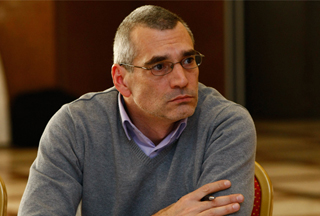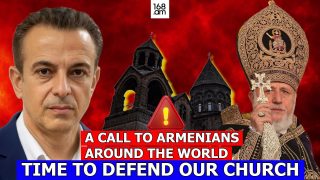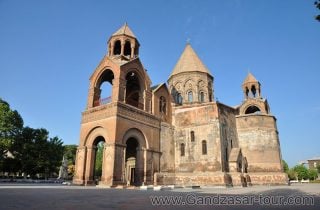Richard Giragosian: “President Sargsyan will ensure that the next Prime Minister is not the successor”

Interview with the Director of the Yerevan-based Regional Studies Center (RSC) Richard Giragosian.
– Mr. Giragosian, how would you assess the unexpected announcement of the Armenian president Serzh Sargsyan, speaking about the initiated project of the constitutional reforms on April 10, that he will not run for the presidency ever, and if Armenia becomes a parliamentary republic after the proposed constitutional referendum, he’ll not run for prime position either?! Can this be considered as a real step on the way of sustaining a constitutional and democratic state or has it any political contexts and aims, nevertheless?
– After many months of silence and secrecy the details of proposed constitutional amendments were finally unveiled. In general, I was very disappointed with the details over the changes to the constitution. But at the same time, President Sargsyan contributed something new to Armenian political history. More specifically, the president announced the he was not going to run for president or stand for office again. Many in Armenia were pleasantly surprised that an incumbent sitting president for the first time in Armenian history promised not to continue in power. But in terms of the constitutional changes that were unveiled, I was disappointed, because they represent a “missed opportunity” for democracy. For example, there is not enough checks and balances on power under these changes: it is unacceptable that even with these changes, the president will still appoint governors of the regions (“marzbets”), will still appoint most ministers of the cabinet, and will still appoint senior military and police officials and almost all judges. In other words, this is a missed opportunity for a “check and balance” of curbing the president’s power. But there was an alternative plan also in the 45-page document and that was a possible alternative of becoming a parliamentary republic where the president is nothing more than a symbolic head of state. Under that proposal, the president will be elected to only one 7-year term, but not elected by the people, elected by the parliament. And given the composition, the corruption and the incompetence of today’s Armenian parliament, such a system would be worse.
– However, there are very beautiful formulations in that 45 page document in terms of the problems of checks and balances, balance of power. And many in favour of these changes argue that these changes can bring more checks and balances etc.
– Just the opposite. In other words, nowhere in these proposed changes is there an institutional roadmap or guide detailing how the checks and balances will work. Unfortunately, it does nothing to address ineffective parliament and lack of independence of the judiciary. And in addition, your question identifies the absence of political will necessary to make it work. What about the second alternative plan, where the real head of the state is the stronger Prime Minister, there is still not enough detail in terms of whether the Prime Minister is to be directly elected by election? The lack of details makes it even less democratic than we have now. In other words, the most significant aspect of the 45-page document is what is missing, not what is in it. For example, there needs to be more elaboration on the issue of a “no confidence” option for removing a sitting government.
– Why the authorities published this project exactly before the appointment of the new Prime Minister of Armenia?
– There are two possible scenarios. The first scenario is that it was designed to distract from an unexpected problem last night (interview from April 11,- A.S.) over choosing a Prime Minister. The second also possible scenario is that it was designed to distract from the reality that there was a problem in Hovik Abrahamian’s candidacy. The government maybe trying to appear that there is a democratic process, therefore, looking weaker, or there is a problem of the process and the result is the same – the government is weaker. What is equally significant is the negotiations over the possible return of “Prosperous Armenia” and “Dashnaktsutyun” parties into a coalition.
– Do you think that Serzh Sargsyan is choosing a successor for him?
– Interesting question! He still has no clear successor and despite the fact that the position of the Prime Minister is traditionally the platform for presidential candidacy, I think President Sargsyan has still not decided to announce or select a chosen successor and I believe that President Sargsyan will ensure that the next Prime Minister is not a candidate. I mean, the next Prime Minister, in my assessment, will be chosen not based on the traditional practice as a next presidential candidate. Anyway, I think that Hovik Abrahamian’s appointment is not only controversial but it will be a mistake.
– I should note, that many from the opposition camp don’t believe that Serzh Sargsyan is honest. They are sure, that the present president, however, wants to keep his power as a stronger Prime Minister after the constitutional changes.
– The opposition has already embarrassed itself by claiming responsibility for Tigran Sargsyan’s resignation. That was an absurd claim, and I also disagree with the opposition opinion, that Sargsyan is lying. Whatever the criticism of President Sargsyan, we do not see a “hunger for power” or an attempt to hold onto power at all cost. And every day that goes by, the return of Robert Kocharian becomes much more impossible, similarly as every day goes by, it seems unlikely that Sargsyan will seek to continue in power.
– So Serzh Sargsyan loves power, but not that much.
– I would not say he loves power, because if we look at his biography, in many ways he was the power behind the presidency for years, as the Minister of Defense, National Security, as a Prime Minister, etc. Sargsyan will continue to have political influence and has the prerogative to appoint the successor actually, but not for him personally. The same with Kocharian, who prefers the role of political influence from behind the scenes. In terms of political speculation, pathetically this move of the constitutional changes can be all about the President Sargsyan’s position, as the “Last of the Mohicans”. As the “Last of the Mohicans”, the last member of this political elite from Nagorno Karabakh the constitutional changes may be seen as necessary to give greater strength to an otherwise weaker successor from a new political elite, because now we are in a period of transition to a new political elite, a different political elite. And this new political elite is inherently weaker and may require such changes to give them greater strength and power.
Interviewed by Aram Sargsyan

























